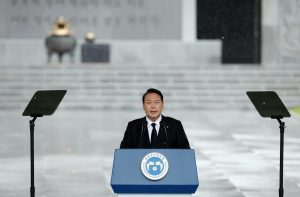On December 31, a South Korean court issued an arrest warrant for South Korean President Yoon Suk-yeol, who was impeached by the National Assembly on December 14 for his illegitimate declaration of martial law. In addition to the impeachment process, the Joint Investigation Unit (JIU) has been investigating allegations of treason against Yoon. As the president has repeatedly refused to appear for questioning or cooperate with the investigations, the JIU requested the arrest warrant for Yoon on December 30.
Despite the issuing of the arrest warrant, it is unclear when the investigation team will proceed. The JIU has not disclosed its plan to execute the arrest warrant yet. According to the constitution, the arrest warrant is valid until January 6.
The Presidential Security Service has acted to bar the investigation team’s attempts to summon Yoon and conduct search and seizure operations on the presidential office. The Security Service may also take action to block the arrest of the president should the police and the investigation team appear at the presidential residence. In this case, the Security Service can be charged with obstruction of justice.
Yun Gap-geun, one of Yoon’s lawyers, said the defense team has filed an injunction to the Constitutional Court, asking the court to suspend the validity of the arrest warrant against Yoon, according to local media reports. Yoon’s defense team has consistently argued that Yoon has not committed treason, claiming that his declaration of martial law cannot be subject to judicial review. Also, his defense team has said the arrest warrant is illegal as there is no legal authority for the JIU to investigate Yoon.
However, as the court issued the arrest warrant, the claims made by Yoon’s defense team have rather highlighted the contrast between the president’s vow not to avoid legal and political responsibility over his declaration of martial law and his stonewalling of the investigations.
Separately from the question of the arrest warrant, the Constitutional Court will also have to issue a ruling to either uphold or overturn Yoon’s impeachment. Currently, however, the court is short-staffed, with only six of the stipulated nine judges on the bench. To remedy that, in light of the ongoing impeachment process, the opposition parties and the public have demanded that the government approve the appointments of three judges proposed by the legislature.
The National Assembly passed a bill to appoint them on December 26. As the three current vacancies at the Constitutional Court are supposed to be filled by the National Assembly, the approval of the president should be a formality with no delay.
However, South Korean Prime Minister Han Duck-soo – who had become acting president upon Yoon’s impeachment – refused to appoint the judges, leading the main opposition Democratic Party to impeach him on December 27. It was the first impeachment of an acting president in South Korea’s history.
With the Constitutional Court issuing its own appeal on the lack of judges, Finance Minister Choi Sang-mok, who took over the acting presidency after Han, appointed two of the three selected judges on December 31. He left the final appointment open, asking the ruling People Power Party and the Democratic Party to reach a consensus on the remaining judge, Ma Eun-hyuk. However, it is questionable whether the government can ask the political parties to discuss the appointment of judges when those vacancies are the National Assembly’s to fill.
Woo Won-shik, the speaker of the National Assembly, condemned Choi’s decision, expressing his regret toward it. He also said he would take necessary steps to deal with the decision. The DP’s floor leader, Park Chan-dae, also criticized Choi’s decision to reserve the appointment of Ma but did not make comments on the possibility of impeaching Choi. As the country is now having a mourning period in the wake of its deadliest airplane crash disaster, the DP is unlikely to impeach the acting president again, as doing so could create a backlash.
The Presidential Office and the PPP also criticized Choi’s approval of two additional judges for the Constitutional Court. Their preferred scenario was Yoon’s return to office after one of the six judges rejected the impeachment in the Constitutional Court. Six judges must agree with impeachment for it to be finalized. With eight judges in the court, more than two judges would have to oppose the impeachment to overturn it, making it more challenging for Yoon to regain his presidential power.
The Constitutional Court unanimously upheld the impeachment of Park Geun-hye in March 2017 with eight judges.
The court will proceed with Yoon’s impeachment trial swiftly as it needs to issue a ruling within 180 days of the National Assembly’s passing a bill calling for impeaching the president. If six of eight judges uphold the impeachment of Yoon, he will formally be impeached and the country will elect a new president within 60 days of the ruling.































